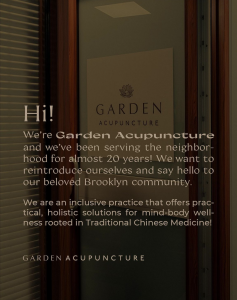Park Slope Brooklyn’s Garden Acupuncture Shares How Acupuncture Is Helping College Students Deal With Ongoing Stress
— Sam F.
BROOKLYN, NY, 11215, November 30, 2023 /EINPresswire.com/ — We will share a study for the effectiveness of acupuncture therapy on stress in Large Urban College Population. For the full link of the research see below:
https://www.sciencedirect.com/science/article/pii/S2005290116301224
https://www.ncbi.nlm.nih.gov/pmc/articles/PMC4203477/
https://annals-general-psychiatry.biomedcentral.com/articles/10.1186/s12991-021-00327-5
This study is a randomized controlled clinical trial to study the effectiveness of acupuncture on the perception of stress in patients who study or work on a large, urban college campus. The hypothesis was that verum (Traditional Chinese Medicine, TCM) acupuncture would demonstrate a significant positive impact on perceived stress as compared to sham acupuncture.
This study included 111 participants with high self-reported stress levels who either studied or worked at a large, urban public university in the southwestern United States. However, only 62 participants completed the study.
The participants were randomized into a verum acupuncture or sham acupuncture group. Both the groups received treatment once a week for 12 weeks. The Cohen’s global measure of perceived stress scale (PSS-14) was completed by each participant prior to treatment, at 6 weeks, at 12 weeks, and 6 weeks and 12 weeks post-treatment completion.
While participants of both the groups showed a substantial initial decrease in perceived stress scores, at 12 weeks post treatment, the verum acupuncture group showed a significantly greater treatment effect than the sham acupuncture group.
This study indicates that acupuncture may be successful in decreasing the perception of stress in students and staff at a large urban university, and this effect persists for at least 3 months after the completion of treatment.
Understanding TCM & Stress:
Research by the American College Health Association’s National College Health Assessment indicates that in 2015, 42.8% students reported more than average stress in the past 12 months, with 10.7% reported being under tremendous stress [3]. Furthermore, 30% of college students reported that stress had negatively impacted academic performance, and 76% of students reported feeling overwhelmed with all they had to do [3]. Thus, treatment providers of all types in collegiate health are much warranted.
The basis of stress in traditional Chinese medicine is commonly rooted in the liver energy imbalance; this pattern of imbalance is often referred to as liver qi stagnation. As stagnation builds over time, individuals can experience a wide variety of symptoms ranging from digestive disorders, such as irritable bowel syndrome and chest distension (a feeling of fullness in the chest), to menstrual disharmonies, such as dysmenorrhea, irregular menses, and premenstrual syndrome in the female population. Commonly, individuals with liver qi stagnation experience emotional challenges including depression, anger, general agitation, and mood swings
Breaking Down The Study:
The treatment group received conventional and auricular acupuncture consisting of needle placement at a predetermined set of point:
GV 20, HT 7, PC 6, Yintang, Four Gates, CV 17, CV 6, ST 36 inserted unilaterally and auricular points: Shen Men, Liver, Point 0, and Heart.
The second group (control group) received sham acupuncture into three points on the body that are located in between meridians and not known to have any effect on stress. Needles were inserted unilaterally and without stimulation or manipulation to avoid the needling sensation known as de qi.
Participants in both groups reported to the clinic once a week; needle retention was 30 minutes.
Both groups received the same supportive interaction with the practitioner, heated acupuncture tables, dimmed light, and soothing music in the rooms during the treatment phase.
Results:
There was a 45.8% improvement in the perception of stress in the verum acupuncture group at the conclusion of the treatment phase, similar to the sham acupuncture group, which showed a 40.3% difference. While both verum and sham acupuncture patients showed a substantial initial decrease in perceived stress scores, at 12 weeks post-treatment, verum acupuncture showed a significantly greater treatment effect than sham acupuncture. After 3 months post completion, the mean PSS-14 score only slightly increased and maintained a 40.2% decrease as compared to the pre-treatment score. The sham group’s PSS-14 score went to a 24.1 % decrease from the pre-intervention score.
Founder
Garden Acupuncture
+1 3479874399
[email protected]
Visit us on social media:
Facebook
Twitter
Instagram
YouTube
Garden Acupuncture: Dermatology
![]()







